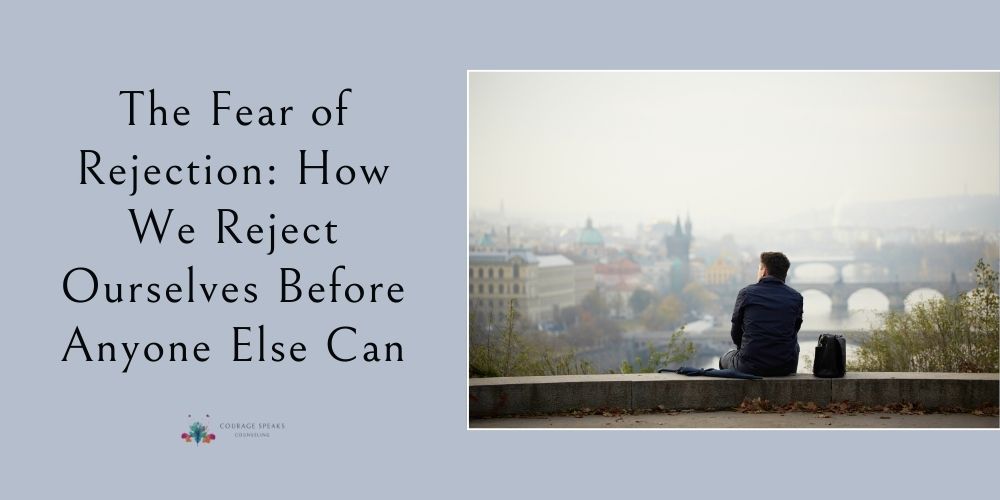
Before, After, and Now: Healing After Life-Altering Events
Healing isn’t about returning to who you were—it’s about learning to live fully in the present and trusting the unfolding of your journey after life-altering events.

Rejection is a profound fear that lurks in the corners of our minds. It often stems from our early experiences, shaping the way we interact with the world and ourselves. This fear can be so pervasive that we begin to preemptively reject ourselves before anyone else has the chance to do so. Understanding this dynamic is essential for healing and growth, allowing us to navigate our relationships and self-perception with more compassion.
Self-rejection can manifest as negative self-talk, harsh judgments, or a reluctance to pursue opportunities and connections. Often, this behavior originates from past experiences where we felt unworthy or unlovable. These internalized beliefs can create a cycle of avoidance, making us feel safer by withdrawing from situations where rejection might occur. However, this self-imposed isolation can reinforce feelings of unworthiness, leading to a deeper sense of loneliness and despair.
When we anticipate rejection, we might rationalize that it’s easier to reject ourselves first—an attempt to protect our vulnerability. Yet, this strategy ultimately undermines our self-esteem and robs us of authentic connections with others.
One effective approach to unpacking the layers of self-rejection is to reflect on our younger selves and experiences that reside within us. Each stage of our life can hold specific feelings, beliefs, and fears that contribute to how we perceive ourselves today. For example, you might notice a younger version of yourself who experienced a significant rejection at school, feeling humiliated and unworthy in that moment. This experience may have cemented a belief that you are not good enough, influencing how you view your worth in later relationships.
As you reflect on these younger selves, engage with the emotions they carry. What would that younger version of you want to hear right now? Acknowledge the pain and fear they experienced and offer them the compassion and reassurance that they needed at that time. This process can help heal old wounds and integrate those parts of yourself into a more cohesive sense of identity.
When you notice feelings of self-rejection arising, it can be helpful to pause and check in with these younger parts. Ask yourself what they might need to feel safe or validated in the present moment. By addressing their fears and providing support, you can gradually shift the narrative from one of rejection to one of acceptance and growth.
Reframing your experiences is also essential in this process. Instead of viewing rejection as a reflection of your worth, try to see it as a natural part of life. Everyone experiences rejection at some point; it doesn’t diminish your value or capability. Working towards integrating these younger selves allows them to coexist with your current self in a more balanced way. This might involve affirming your strengths, reminding yourself of past successes, and consciously choosing to step outside your comfort zone, despite the fear of rejection.
Overcoming the fear of rejection is a process that requires patience and practice. Cultivating self-compassion is crucial, as it encourages you to treat yourself with the same kindness you would offer a friend. When you face rejection, it is important to acknowledge that it’s okay to feel hurt, but also to recognize that it doesn’t define who you are. Seeking support from friends or a therapist can provide perspective and help you feel less alone in your experiences.
Embracing vulnerability is another critical aspect of building resilience. By challenging yourself to take small risks in your relationships and pursuits, you create opportunities for growth. Each time you express your true self, even in the face of potential rejection, you build resilience and confidence. Reflecting on past experiences where you faced rejection and how you coped can also offer valuable insights. Recognizing patterns in how you navigate these situations can empower you moving forward.
The fear of rejection is a common human experience that can lead us to reject ourselves before anyone else has the chance. By engaging with the younger parts of ourselves, we can uncover the underlying beliefs driving this behavior and cultivate a more compassionate relationship with ourselves. Remember that vulnerability is not a weakness; it’s a pathway to connection and growth. As we learn to embrace our authentic selves, we open the door to deeper relationships and a more fulfilling life, free from the constraints of self-rejection.
Embracing Shadows, Illuminating Hope,
Chelsey Fjeldheim, LCSW
Empowering Souls on the Path of Healing
Copyright © 2024 Chelsey Fjeldheim, Courage Speaks Counseling

Healing isn’t about returning to who you were—it’s about learning to live fully in the present and trusting the unfolding of your journey after life-altering events.

Healing isn’t about fixing yourself. It’s about staying present, feeling fully, and letting transformation happen without force.

There’s no perfect time to start therapy, but if you feel stuck, disconnected, or overwhelmed by change, it might be the right time to explore it.

Because you matter. You are important. You are worth it.